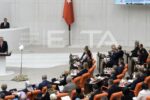Vilnius Regional Court declared that Dailius Dargis, author of a book “Real History of Daktarai Mafia Family” is found guilty for disclosing personal information and hence violating personal rights of Mr. Henrikas Daktaras.
The “sins” of a book writer were estimated to 6 000 LTL, down from the original demand of 150 000. Both sides will appeal against the verdict, so let’s leave this legal battle for a while and consider the general situation of the freedom of speech in Lithuania.
Mr. Dainius Radzevičius (Chairman of Lithuanian Journalist Union) and Ms Liudvika Meškauskaitė (a lawyer specialising on similar cases) both see this danger occasionally occurring. A journalist convicted in a criminal case last year – Mr. Gintaras Visockas – also has his own categorical opinion on this matter.
When talking to Balsas.lt, all three respondents held to their own specific viewpoints, but obviously they are all concerned about a future of the freedom of the press. Decriminalization of a freedom of speech is seen as the only possible logical solution. A number of democratic countries have done that already, but Lithuania is not following the example just yet.
The dilemma
For information publishing, a line between a legal activity and a criminal act is not strictly defined. The interpretation space is threatening journalists who may be prosecuted for seemingly innocent wording. Practice shows that feeling insulted and using a well-paid lawyer is all that it takes to start searching for “your own truths”.
For a few noteworthy details, let’s get back briefly to the verdict favoring Mr. Daktaras. According to the court, the book has illegally disclosed the illness of Mr Daktaras’ father, as he was already dead by that time. This detail didn’t escape the eyes of Mr Daktaras attorney – and neither the eyes of a judge.
Mr Daktaras’ attorney – Mr Kristupas Ašmys – was not feeling friendly when asked for comments about a court ruling that is potentially threatening the freedom of the speech. “I haven’t seen the full court ruling yet, so I cannot comment. And I will not say anything about ‘crossing lines’ or ‘emerging threats’ neither. Why? Because I don’t want to”, said Mr Ašmys.
Meanwhile the journalist claims that he is not stopping after a court ruling and he is determined to prove the truth and defend the freedom of a speech by appealing the verdict. His attorney, Ms Aušra Ručienė, has also confirmed the plan.
“The court argumentation is totally incomprehensible. The decision is neither legal nor reasoned. Moral compensation was awarded for disclosing a father’s illness. That information was made public as much as 10 years ago, so it had to be time-barred. According to the experts, the argument of information source is not valid; these findings haven’t been disputed at all”, – argues Ms Ručienė.
Former police chief Mr Vytautas Grigaravicius perceives a certain threat as well: a dangerous precedent is being created.
“I don’t want to discuss the details of the case itself. Mr Daktaras has just exploited certain legal opportunities. But I believe that such court rulings, such examples are contagious, and I wouldn’t be surprised if we started seeing more and more of such cases in future”, says Mr Grigaravicius.
Appealing to the ECHR
An independent journalist Gintaras Visockas has also experienced quite some blows from the Lithuanian courts: on January 2011 he was found guilty of committing a criminal act – insulting a former presidential candidate Česlovas Jazerskas. Vilnius Regional Court in its final ruling imposed a fine of almost 25 thousand LTL, plus the legal fees and the court expenses.
Mr Visockas has appealed to the European Court of Human Rights (EHCR), but the whole process is far from being finished any time soon. „As far as I know the case will continue for at least three years more. Many things may change during that time, and meanwhile a part of my every salary goes to a victim – to General Jezerskas that is. I am the biggest criminal now“, ironized Mr Visockas.
The convicted journalist points out that it is not the words he was convicted for: quite the contrarily, both courts convicted him for „what a statistical Lithuanian reader might have thought” instead. „The facts that I‘ve presented were true and nobody denied them. The Language Commission found my wording was okay as well. But the judges nevertheless found me guilty of insulting the presidential candidate. This ruling is absurd, but there are no more opportunities to appeal it in Lithuania – ECHR is the only remaining opportunity”, said Mr Visockas.
According to the journalist, nowadays it’s quite hard to guess rules of a game “Justice vs journalists”. “It’s confusing that the ‘statistical reader’ card can be used at any time. We’ve appealed to the Supreme Court (even though the Supreme Court is not considering such cases) with a request to review the case. All we got was an answer that the ruling is sound and valid. No argumentation whatsoever”, said Mr. Visockas.
In his interview to Balsas.lt, Mr Visockas remembered discussing with Turkish colleagues. According to them, Turkey’s authorities are more subtle when persecuting local reporters. Open attacks on the journalists are typically avoided. Instead, drugs or guns are slipped to the inconvenient journalists and criminal cases are built. But the journalistic activities are never punished directly in a fear of criticism or disapproval from international organizations.
“In Lithuania, a journalist is punished for what a statistical reader might be thinking. The court did not consider a fact that Č. Jezerskas was a public figure at the time, he was bidding for a presidency. Such person should be open and tolerant to the public criticism. Moreover, the facts in my article were true, only my opinion was negative about them. I don‘t want further problems – so I‘m not repeating those facts here – but I was questioning if Mr general would be able to cope with the state affairs if he‘s not able to deal with his own family life“, remembered Mr Visockas.
Press freedom index dropped
Chairman of Lithuanian Journalist Union (LJU) told us that an objective assessment of a situation is possible. “You can see by various press freedom indexes that Lithuanian situation has worsened last year. And not only in Lithuania, but in some other countries as well – Sweden for instance. Lithuanian criminal and civil cases indicate certain symptoms”, stressed Mr Radzevičius.
According to the LJU chairman, the Organization for Security and Cooperation in Europe (OSCE) last year stated the position on decriminalization of freedom of speech. „Criminal penalties should only be imposed in exception cases – for example when a journalist caused a direct physical threat by revealing some information. To err is human, sometimes it is just not possible to check all the facts, so things should be treated more liberally”, said Mr Radzevicius.
Mr Radzevičius added that Lithuania still retains some attitudes that are more typical for not-so-democratic countries. “Currently freedom of expression is criminalized way too often. Courts started regarding such situations very radically. The same politicians throw a lot of mud at each other without consequences, while the journalists are severely punished for incorrect interpretation of the fact”, told Mr Radzevičius.
Abnormal situation
Jurist Ms Liudvika Meškauskaitė has stressed that legal actions against mass media means the situation is not normal. “Lithuanian journalists are being tried and convicted for defamation or insult. Of course, anything happens and there are certain norms to be followed, but it all should be dealt with in terms of civil procedures – by denying incorrect information, or compensation of moral damages – but never criminal”, claims Ms Meškauskaitė.
She referred to the example of journalist Visockas. “Mr Visockas is an independent journalist who lives on his own. He sustains himself; he’s independent from any political forces. But that didn’t stop criminal case where the journalist was convicted. Let’s wait for a word from ECHR”, said Ms Meškauskaitė.
According to Ms Meškauskaitė, anyone can be accused under the current legal system. “You call me a black sheep and I claim insulted by a journalist. As soon as you come to the court hearings, you become a criminal suspect. Such harassment may create a fear for expressing opinions. And that is doom for freedom of expression”, stressed Ms Meškauskaitė.
According to the jurist, the only possible way for solving this problem is amendment to the Criminal Code. “Laws must be changed. Civil liability should stay there in any case. In a real world many wrong words are being spoken or written, and that causes harm. But it is not necessary to turn journalist into criminal offenders”, concluded Ms Meškauskaitė.
In the pictures: Liudvika Meškauskaitė, attorney in law for journalist Gintaras Visockas.
2012.05.13











